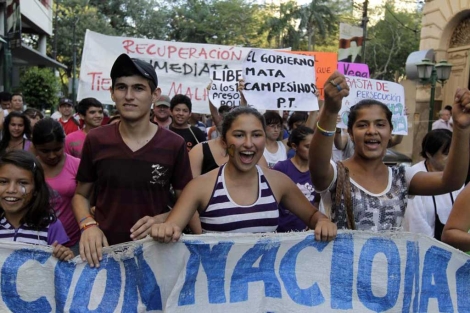By Brendan Oliver Bergh
Impunity Watch Reporter, South America
BUENOS AIRES, Argentina – For the first time in eleven years Argentina has succumbed to massive looting when on Dec. 20, groups of masked individuals began invading and looting six supermarkets in San Carlos de Bariloche. The looting spread throughout the province as stores in major cities from Rosario to Santa Fe were set ablaze before looters began looting Beunos Aires.

Early Thursday President Cristina Fernández de Kirchner dispatched a regiment of 400 militarized police before the country descended into chaos. Since then, the police have been mobilized in all areas experiencing this country wide state of mayhem.
Historians have noted the similarities between those broke out in December 2001, which resulted in some 40 deaths and the resignation of then-president Fernanndo de la Rúa. The rioting was seen as a direct result from the collapse of the banking industry, the recession and country default on public debts.
While Fernandez was quick to question the Labor unions involvement with the organization, leaders from the Federation of Argentine Workers and the general Confederation of Labor Hugo Moyano were quick to deny responsibility, claiming “This is probably triggered by the difficult situation the people of Argentina are facing.”
President Fenandez may have been right to question the Labor unions, who late last month organized mass work stoppages which caused some spare looting. Workers are struggling as the economy failed to expand beyond 2% this year, despite a steady growth rate of about 8% for the past ten years. This year has also marked a stark increase in food prices with inflation increasing well above 20%.
Activists who have used similar tactics in the past tend to traditionally block access to supermarkets during December and demand free food. Beyond the millions of rioters in 2001, these protests rarely turn violent.
While the militarized police force were forced to employ the use of tear gas and rubber bullets to turn looters back, gunshot victims are not immediately associated with the polices use of force. At least 3 people were shot and killed during the initial clash on Thursday evening, with another 21 injured as a result of the violence.
As the police have attempted to restore order, hundreds have been arrested for their participation and aggression among the mayhem.
While another blow to President Fernandez’s waning popularity, her administration has stressed that despite complaints about food prices that is not what is being stolen. Looters have been using the opportunity to steal computers and televisions, not food staples as one would expect from a protest against economic policies.
For further information, please see:
Rosario – She Died A Woman Who Was Shot In The Looting – 26 December 2012
World War 4 Report – Argentina: Massive Looting Returns After 11 Years – 25 December 2012
BBC – Argentina Looting Spreads To Buenos Aires Province – 22 December 2012
The Wall Street Journal – Looting Tests Leader In Argentina – 21 December 2012



